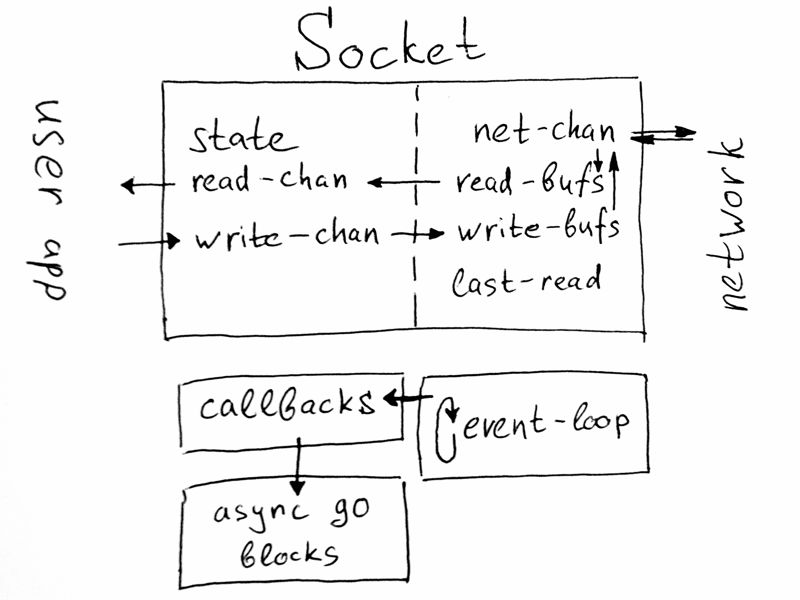This library is aimed at providing reliable, high-level, bidirectional message-oriented communication over TCP/IP.
- Send/receive messages, not data streams. It's what you need most of the time, anyway.
- Automatic reconnections when connection is lost.
- Stuck connection detection via heartbeats.
- Stable interface: chans stay valid to use no matter what socket/network conditions are. net.async will handle underlying resource/socket management for you.
- No exceptions: disconnects are normal state of network connection and are exposed explicitly at top-level interface.
Here’s how it works:
[net.async/async "0.1.1"]
<event-loop> is { : running? <atom [true/false]> }
<client-socket> is { :read-chan <chan>
:write-chan <chan> }
<accept-socket> is { :accept-chan <chan> }
<payload> is byte[]
(require '[clojure.core.async :refer [<!! >!! close!]])
(use 'net.async.tcp)
(event-loop) → <event-loop>(connect <event-loop> {:host "127.0.0.1" :port 9988}) → <client-socket>
(<!! read-chan) → :connected | :disconnected | :closed | <payload>
(>!! write-chan <payload>)
(close! write-chan)Client will automatically reconnect if it loses its connection to the server. During that period, you'll get :disconnected messages from read-chan. Once connection is established, you'll get :connected message and then normal communication will resume.
As a side-effect of this, you can start client before you start server. Once server becomes live, client will establish the connection and start sending/receiving messages, all of this without any effort from your side.
(accept <event-loop> {:port 9988}) → <accept-socket>
(<!! accept-chan) → <client-socket>
(close! accept-chan)(shutdown! <event-loop>)(connect <event-loop> <addr>
:read-chan (chan (dropping-buffer 10))
:write-chan (chan (sliding-buffer 7))
:reconnect-period 5000
:heartbeat-period 8000
:heartbeat-timeout 24000)
(accept <event-loop> <addr>
:accept-chan (chan 2)
:read-chan-fn #(chan (sliding-buffer 7))
:write-chan-fn #(chan (dropping-buffer 10))
:heartbeat-period 8000
:heartbeat-timeout 24000)Note thatn you'd better configure heartbeats the same way at both connecting and accepting sides.
(defn echo-server []
(let [acceptor (accept (event-loop) {:port 8899})]
(loop []
(when-let [server (<!! (:accept-chan acceptor))]
(go
(loop []
(when-let [msg (<! (:read-chan server))]
(when-not (keyword? msg)
(>! (:write-chan server) (.getBytes (str "ECHO/" (String. msg)))))
(recur))))
(recur)))))
(defn echo-client []
(let [client (connect (event-loop) {:host "127.0.0.1" :port 8899})]
(loop []
(go (>! (:write-chan client) (.getBytes (str (rand-int 100000)))))
(loop []
(let [read (<!! (:read-chan client))]
(when (and (keyword? read)
(not= :connected read))
(recur))))
(Thread/sleep (rand-int 3000))
(recur))))
